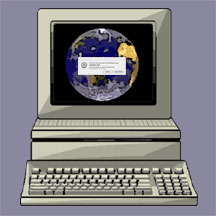:: Wednesday, August 10, 2005 ::
ART AND GLOBALIZATION THREAD
Turnoff: comments on PC turnoff week by Lora McPhail I hadn't looked at it in a week. On an experimental whim I chose to log-off, shut down and walk away without warning or planning. I was disconnected. For the entire week of August 1-7 I observed "National Turn-off Your PC Week," an attempt to get American gamers, surfers and digital doodlers off their terminals and out into the wonders of summer. I had great ambitions for what I would spend my newly liberated time on: Talking, rather than typing, to old friends; walking the dogs at golden hour; filing all those leaves of tree pulp I ignore in favor of electronic organization; plant an herb garden. The unmediated bliss seemed endless. And yet, it was the longest week of my recent-life.
I hadn't looked at it in a week. On an experimental whim I chose to log-off, shut down and walk away without warning or planning. I was disconnected. For the entire week of August 1-7 I observed "National Turn-off Your PC Week," an attempt to get American gamers, surfers and digital doodlers off their terminals and out into the wonders of summer. I had great ambitions for what I would spend my newly liberated time on: Talking, rather than typing, to old friends; walking the dogs at golden hour; filing all those leaves of tree pulp I ignore in favor of electronic organization; plant an herb garden. The unmediated bliss seemed endless. And yet, it was the longest week of my recent-life.
After powering-off the next thing was to layout some ground rules and define the parameters of "personal computer." I could easily shut of my desktop system and still have access to most services I use via my mobile phone. So, I devised that I should be able to call my mother in Scotland and receive calls from my husband. I was also permitted to use my computer at work for work-related tasks only--no surf-peeks while waiting for our ancient printer to load a financials page into memory; no renegade email to friends under the subject banner "Act Now." I was as unplugged as I could conceive of.
What hadn't occurred to me, or the proponents of this suggestion, was how integral my computer is to my daily functioning. I have nearly given up my telephone with fewer repercussions than shutting down my PC for a week. Yet, this electronic extension was more a member of the family than appliance, and her absence was sorely felt, like a child gone to camp or the grandparents. Without her I couldn’t get anything done in a timely manner. I couldn't call long-lost friends as planned since my contact list was locked inside an Excel document. I didn't have an inlet for receiving news. My bills are all paperless and my accounts online, so a few late-fees were part of the cost of experimentation.
More particularly was how this intervention affected my everyday. In a way, the process of sitting down with coffee and hearing the start-up tone activates my day. I find that I am structured by my interaction with my computer. The practice is my interface with life. It is how I make primary contact with and define the world around me. Perhaps this is condition of routine. Or, perhaps it is simply reflective of how I interact with my peers and our mutual capabilities. There were many years in my life where I thrived without this connectivity, and yet now, the removal of it is nearly crippling.
So as an individual of particular social place and economic opportunity, as emphasized by this experience, I asked myself to consider the current topic of globalization as a hypothetical extension of being temporarily disengaged from the global dialog. The truth is that I was not severed in fact only in habit. There was always an opportunity for social and intellectual engagement, it just required a different "interface." I realized that although my patterns of desire and interest have led me to find colleagues and opportunities around the globe, does not negate the possibility of finding something comparable or unique within the more limited sphere of a car ride, or even a walk.
The fact is that my interaction with the person I encounter around the corner is no less powerful than if it were an individual in Beijing. While this may not hold truth in a political or economic argument, I believe it to be practical for a human one. Communities are chosen and narrowed for the sake of interest and practicality, even online. The mode of expression changes the how, but not the why. In the history of humankind technology has never managed to preempt human objective. Rather it is the instrument of it. While it may facilitate or manifest particular behaviors or directions, the basic drives for communication and narration do not seem to change.
Globalization is an argument shaped by the motivations of myriad philosophies. And like most philosophical arguments the parameters are arbitrary, defined by the rules of engagement. They are not absolute. That under the political, economic and academic rhetoric there is a human practicality that is equally worth addressing. Why are we as participants interested in the process of "globalization"? How does it serve or threaten us? And are the prejudices of our own habits moving us to contextualize something that is as continuous as history rather than a novel and discrete phenomenon? While the world may be systematically divided, are we not more similar in our humanity than any technology can mediate?